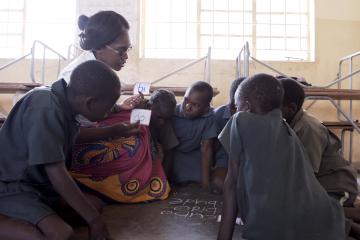La evidencia de las evaluaciones aleatorizadas está cambiando la forma en que entendemos y abordamos los problemas relacionados con la pobreza. Los formuladores de políticas, profesionistas y fundaciones de todo el mundo están utilizando cada vez más estos aprendizajes en las políticas y programas sociales. Más de 600 millones de personas han sido alcanzadas por programas que se escalaron después de ser evaluados por investigadores afiliados a J-PAL. Muchos más se han beneficiado de las diversas y amplias formas en que la evidencia puede informar las políticas que se describen a continuación.
Pathways to Policy Change
A federal office to bolster evidence-based policymaking
J-PAL staff and affiliates contributed to the creation of the Office of Evaluation Sciences (OES) to improve the capacity of US federal agencies to build and use rigorous evidence and continue to partner with OES to aid this mission.
Un laboratorio de innovación gubernamental para mejorar la educación
Con apoyo de J-PAL e Innovations for Poverty Action (IPA), el Ministerio de Educación de Perú, creó una unidad dedicada a identificar, testear y escalar intervenciones de bajo costo para mejorar resultados educacionales.
Artificial intelligence to strengthen high school students’ writing skills
The state government of Espírito Santo, Brazil applied research findings to scale an AI education technology that gives public school students feedback on their writing, reaching more than 100,000 high school seniors to date.
Communicating Covid-19 messages at scale via social media
Researchers applied insights from earlier Covid-19 messaging research to launch a large-scale Facebook messaging campaign and corresponding evaluation reaching more than 35 million people.
Community-based targeting to combat Covid-19-induced poverty
Using community targeting methods to distribute cash transfers during Covid-19 has provided relief to over eight million recipients previously unenrolled in any social protection program in Indonesia.
Diseñando un programa de protección social durante el Covid-19
Profesores afiliados a J-PAL apoyaron al gobierno de Chile a diseñar un programa de transferencia de efectivo durante la pandemia de Covid-19, que alcanzó de más de 3 millones de hogares.
Digitizing social services to reach the right people and reduce poverty
Shifting from in-kind food assistance to electronic vouchers helped reach the poorest households and reduced poverty in Indonesia.
Emissions markets to reduce air pollution
A market for air pollution was scaled to reach over 15 million people in Gujarat, India.
Fund flow reform for social program delivery
Central and state governments in India have adopted a financial reform to enhance public service delivery informed by evidence.
Giving directly to support poor households
GiveDirectly has expanded its cash transfer program, which was found in a randomized evaluation to have improved economic and psychological well-being in Kenya, to reach over 1.6 million people in Bangladesh, DRC, Kenya, Liberia, Malawi, Mozambique, Rwanda, and the United States.
Help desks to improve women's access to justice
In India, the state of Madhya Pradesh scaled women’s help desks to 950 police stations statewide, making it easier for women to register crimes.
Improving youth sexual health through educational entertainment
A randomized evaluation found that the educational TV drama series Shuga increased HIV testing and reduced the stigma around sexual health among young viewers in Nigeria.
Individualized tutoring to improve learning
Saga Education’s intensive math tutoring program has been shown to improve academic outcomes and has now reached 12,000 students facing barriers in the United States.
Información y fiscalización para la reducir la sobrepesca
Evidencia de una evaluación aleatorizada y un análisis de costo-efectividad llevaron al gobierno chileno a expandir una campaña de información a consumidores para proteger a las especies marinas en riesgo.
Información y mediación para mejorar los Tribunales Laborales
El gobierno de México utilizó información de una evaluación aleatorizada para orientar una ley laboral nacional.
Institutionalizing a culture of evidence-informed policymaking in Tamil Nadu
A long-standing partnership between the Government of Tamil Nadu and J-PAL in India has helped institutionalize the use of evidence in decision making and build a culture of evidence-informed policymaking.
Interactive curriculum to reshape gender norms
In India, the state governments of Punjab and Odisha are scaling up an evidence-based gender transformative education program in government schools with the NGO Breakthrough, reaching 4 million students across both states by 2026.
Limits of technological solutions to provider monitoring
Based on evidence that biometric monitoring technology did not increase doctors' attendance at primary health centers, the government of Karnataka decided to end the program, saving taxpayers millions of dollars.
Lowering barriers to contraception use through mass media
An evidence-based family planning campaign delivered via mass media was scaled up across Burkina Faso, reaching 80 percent of the country’s population, and adapted in seven countries in southern and eastern Africa.
Mobile conditional cash transfers to improve routine childhood immunization
The Health Department of the government of Sindh, Pakistan used rigorous evidence from a randomized evaluation to support the scale-up of an incentive program to increase routine childhood immunization coverage and timeliness.
Normalizing mask usage to combat Covid-19
A community-level mask distribution and promotion program tripled mask usage in Bangladesh and is now being scaled up in multiple countries, reaching almost 14 million people in South Asia so far.
Parental engagement to improve children's schooling
The French Ministry of Education has expanded a parental involvement program to all public schools in the country on a voluntary basis.
Tecnología basada en telefonía celular para la entrega de información agrícola
Precision Agriculture for Development se basó en los resultados de dos evaluaciones aleatorizadas para crear y difundir un nuevo modelo de extensión agrícola basado en teléfonos celulares.
Promoting housing choice to improve economic mobility
Evidence from a flagship randomized evaluation in the United States prompted legislative and administrative changes to expand housing choice for low-income families.
Providing school quality information to improve housing mobility for low-income families
After research found that providing families with information on school quality increased Housing Choice Voucher recipients’ moves to neighborhoods with higher-rated schools, an affordable housing website expanded the provision of school quality information to all of its 60,000 daily site users.
Simplified reminders to increase take-up of tax credits
Following an evaluation in California testing variations of reminder letters to low-income households to increase take-up of tax credits, the US tax agency scaled up nationally the use of reminders that simply and prominently displayed potential benefits.
Strengthening initiatives to support women facing violence through a government collaboration
To better support women experiencing gender-based violence, the Mexico City Women's Committee (SEMUJERES) partnered with J-PAL affiliated researchers and J-PAL LAC to pilot new interventions, improve a cash transfer program, and embed evidence-informed practices into policy design and delivery.
Strengthening third-party audits to reduce pollution
Evidence from a randomized evaluation informed the scale-up of a pollution audit policy in Gujarat, India.
Targeted information to improve social assistance
A government scale-up has improved access to targeted social programs for 65 million people.
Targeting the ultra-poor to improve livelihoods
A multifaceted livelihood program has reached and improved the standard of living for more than three million households across 15 countries following randomized evaluations by J-PAL affiliates.
Training brick manufacturers to reduce emissions in Bangladesh
Training brick kiln owners and operators in cleaner practices reduced coal burning and improved air quality in Bangladesh.
Tutoring to accelerate learning
Research has shown that high-dosage tutoring helps students catch up. Governments and agencies across the United States are implementing tutoring programs to accelerate learning in the wake of Covid-19.
Efectos no intencionados de currículos anónimos
El gobierno francés descartó una política que hubiera requerido que las empresas tomaran decisiones de reclutamiento basadas en currículos anónimos, luego de que la evidencia mostrara que un programa piloto voluntario en realidad perjudicaba las oportunidades laborales de las y los postulantes...
Using rigorous impact evaluation to help people find jobs
The French Public Employment Service has incorporated rigorous evidence from randomized evaluations into its decision-making processes to improve employment outcomes of job seekers throughout the country.
Video-based support for small-scale farmers around the world
Digital Green leveraged findings from randomized evaluations to refine and scale its video-based agricultural extension model, reaching more than 7.2 million small-scale farmers in India and around the world.
Policymaker Voices
Enhancing Delivery through Financial Reform of MGNREGS
Using Identification Cards to Improve National Social Assistance in Indonesia
Resources
La página de recursos de Evidencia en Acción entrega herramientas para quienes formulan, implementan o financian políticas y programas, y cualquier otra persona interesada en utilizar la evidencia para el desarrollo de políticas. Estos recursos ofrecen orientación práctica para adaptar la evidencia de un contexto a otro, evaluar si un programa está listo para ser escalado, promover una cultura de uso de la evidencia, y más. Ver todos los recursos de Evidencia en Acción.


